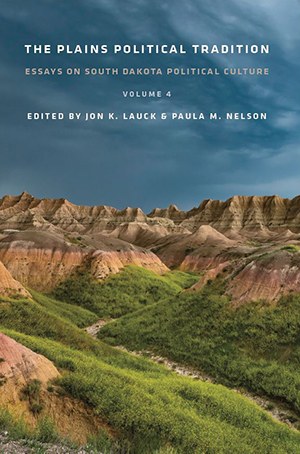
Purchase
Available Now!
South Dakota's unique blend of ethnic cultures, varied landscapes, and small, largely agrarian population have made for fascinating politics. This fourth volume of The Plains Political Tradition offers ten essays on diverse aspects of the region’s political history, from nonindigenous settlement patterns to campaign strategies to the shaping of state budgets. Employing a broad definition of political culture, editors Jon K. Lauck and Paula M. Nelson present a wide variety of eyewitness as well as scholarly perspectives in this anthology, all of which contribute to a better understanding of South Dakota’s singular historical experience.
Contributors:
Justin Blessinger
Michael Card
Marshall Damgaard
Sean J. Flynn
Paul Higbee
Jon K. Lauck
Paula M. Nelson
Randi Ramsden
Gregory Rose
Tonnis H. Venhuizen
Daryl Webb
Paul Wilson
Praise for The Plains Political Tradition 3:
"Against a backdrop of agricultural ups and downs, varied religious beliefs, worldwide conflict, and powerful personalities, The Plains Political Tradition deftly examines ingredients critical to the success and failure of civic movements, legislation, and political campaigns and careers. Exceptionally well organized and presented."—Midwest Book Review
About Vol. 3: Not all politics is party politics. Nowhere is this fact more apparent than within the boundaries of South Dakota. Although the state is known for its agrarian conservatism, political tradition in the land of infinite variety is more than simply Republican or Democrat. An awareness of the influence of culture lies at the core of understanding the decisions of political leaders and voters alike.
In this volume of The Plains Political Tradition series, editors Jon K. Lauck, John E. Miller, and Paula M. Nelson gather essays from historians and other scholars who identify major influences on the political culture of South Dakota. Against a backdrop of agricultural ups and downs, varied religious beliefs, worldwide conflict, and powerful personalities, the authors examine ingredients critical to the success and failure of civic movements, legislation, and political campaigns and careers.
